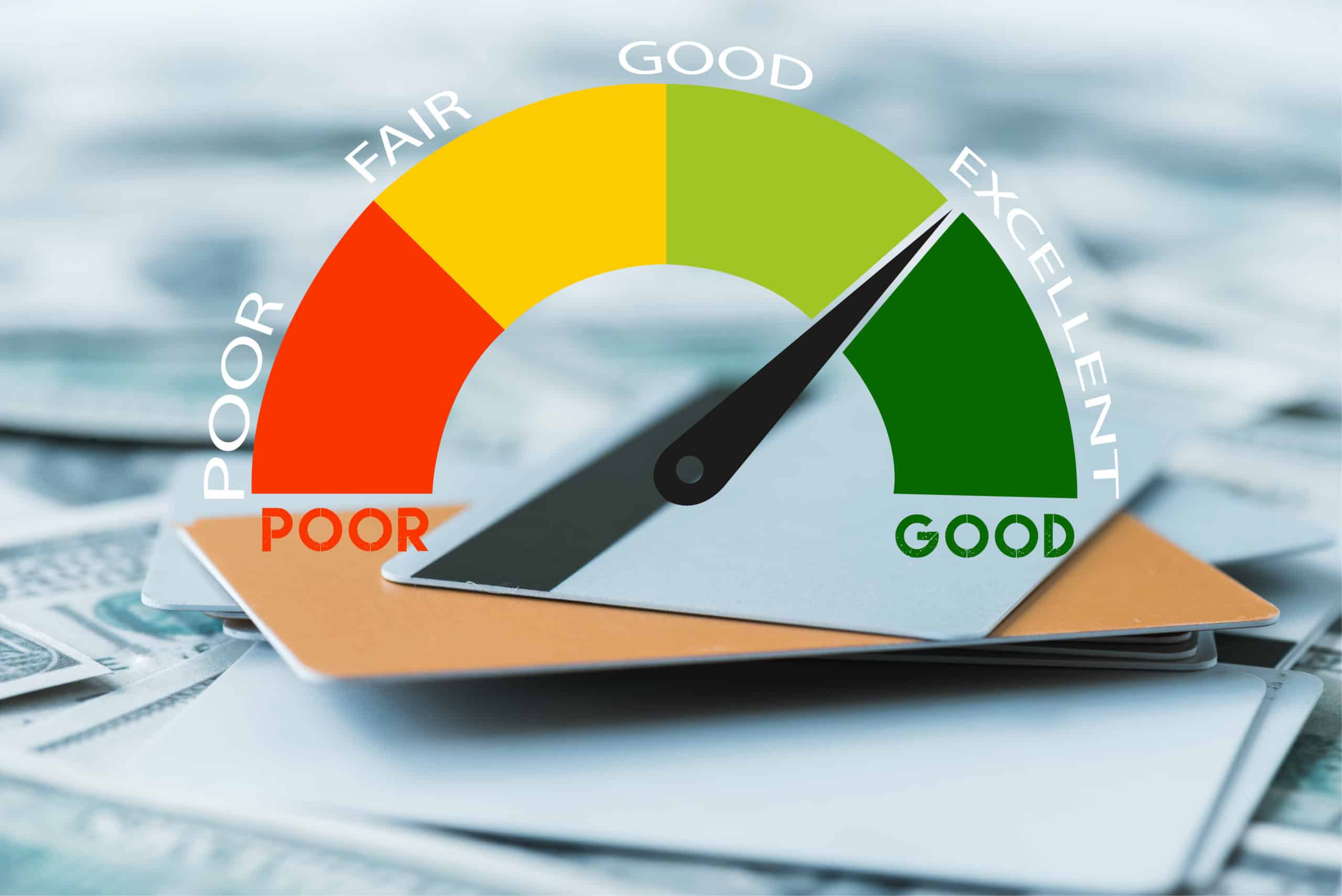
If you’re focused on building your credit score and aren’t sure where to start, you may be worried about what it will take. How can you improve your credit score, and how long will it realistically take?
You may be surprised to know that it’s easier to improve your credit score than you may think. Here’s how you can do it and do it quickly.
What credit score do you start with?
Technically, you don’t start with a specific credit score. If you’ve never applied for a loan or credit card, and don’t have anything on your credit, your credit score simply doesn’t exist.
However, once you start focusing on building your credit, the base credit score starts at 300. But most people who start building new credit fall between 550-650. This could lower your credit score if you’ve got negative marks, but new credit typically raises your score.
Related Article: Does Your FICO Score Really Matter?
What is the average credit score by age?
According to American Express, the average credit score by age is as follows;
- 20-29 Years Old: 662
- 30-39 Years Old: 673
- 40-49 Years Old: 684
- 50-59 Years Old: 706
- 60+ Years Old: 749
If you currently fall on the average score for your age or higher, you’re considered in good shape.
What is the fastest way to raise a credit score?
If you need to raise your credit score fast, the easiest way to do it is to increase your current credit limits and get some good marks on your credit report.
You can do this by calling your credit card company (or companies if you have multiple cards) and see if they can increase your credit limit. This helps your credit score by lowering the debt ratio and shows that you’re in good standing with the credit card lender.
The other step is to get good marks on your credit report. You can do this by using a site like Experian Boost, which reports payments you make on subscriptions like Netflix and your phone bill.
It can take upwards of 60 days to see the increase in your credit report, but some users have reported seeing an increase of up to 50 points in their scores.
Related Article: 8 Apps That Will Help You Manage Your Money Better
How can I raise my credit score in 30 days?
You can ask for a credit increase with your lenders or use a site like Experian boost.
If you don’t have any credit at all, you can also become an authorized user on someone else’s credit card. We don’t recommend this unless the person is incredibly responsible with their finances, but it can be an easy boost to your score.
And, once your credit has been raised or you get your own credit cards or loans, we recommend removing the authorization.
How many points does your credit go up a month?
On average, your credit score will increase a few points each month. However, this depends on your credit limits, how much you owe, and if you make your payments on time. We will discuss how you can increase your credit score month to month.
How do you get an 800 credit score?
To get an 800 credit score, you’ll typically need years of good credit history, higher credit limits, and low or no utilization/debt. Only about 20% of Americans have an 800 credit score.
While it’s a great achievement, it isn’t always necessary to reach other financial goals. But, if you want to reach an 800 credit score, we will discuss how you can make it easier to achieve.
Related Podcast: The Super Serious Guide to Modern Money Management
How long does it take to build credit from 600 to 700?
This depends on why you have a 600 credit score. If you’re just starting out in adulthood and trying to build your score but don’t have much credit, you could reach a 700 credit score in less than a year if you’re diligent.
But if you have delinquent payments or collections on your score, it could be harder to build it from 600 to 700. And, it could take longer to reach this goal since you’d need to take care of the negative accounts.
Related Article: Is Credit Repair Right For You?
How long does it take to get a 720 credit score?
If you’re starting from scratch, you could theoretically reach a 720 credit score in about six months to a year. But if you have any negative accounts or extreme amounts of debt, it may take a bit longer to build to a 720 credit score.
How long does it take to go from a 700 to 800 credit score?
It’s significantly easier to build your score from 600 to 700 than from 700 to 800.
This is because a 700 credit score is considered good, and it’s harder to build credit fast when it’s based on your credit history and payments.
Once you’ve gotten that first boost in your credit score from opening new accounts and getting credit limits, you’ll need to focus on keeping your debt to a minimum, making on-time payments, and keeping credit card accounts open for longer periods of time. This will help you go from 700 to 800.
Why is my credit score going down when I pay on time?
When you first pay off a loan, like a car loan, your credit score may go down. This is because your credit history is shortened, which accounts for 10% of your score. However, after a month or two, your credit score should even out and raise back up.
When should I pay my credit card bill to increase my credit score?
The best time to pay your credit card bill is a few days before the due date listed on your monthly statement. This does two things;
- Decreases the amount you owe, if you carry a balance and lowers interest charges
- Shows that you’re paying your bills on time, which is reported on your credit report
You should also pay off your balance in full to lower your utilization score if you can. But if you can’t do that right away, at least pay the minimum and try to avoid future debt so you can pay off the card.
Related Video: 5 Tips To Get Out of Debt This Year
Should you carry a balance on your credit card?
No, paying your credit card in full each month is best. But, credit card debt is common, and this doesn’t mean you’re a bad person.
Life happens, and sometimes we get into debt due to unforeseen circumstances. So if you carry a balance at any point, simply plan to pay it off as soon as possible.
How to improve your credit score
While building your credit score can seem complicated at first, it’s actually easy to improve it over time. Here’s how you can improve yours in less than a year.
Review your credit reports
In order to improve your credit, you need to know what it is. And you’ll also want to ensure that you don’t have any negative marks due to fraud or identity theft.
You can pull a free copy of your credit report from each of the three major national credit bureaus — Equifax, Experian, and TransUnion — once a year. From there, you’ll be able to make a solid plan on increasing your score.
Related Video: How To Prevent Identity Theft | Do This NOW!
Pay your bills on time
Now that you know your current credit score, it’s important to focus on the biggest factors that it’s based on. The first is paying your bills on time.
Your credit score is determined by five distinct factors:
- Payment history (35%)
- Credit usage (30%)
- Age of credit accounts (15%)
- Credit mix (10%)
- New credit inquiries (10%)
As you can see, your payment history has the biggest impact on your credit score. This is why paying your bills in full, on time, each month is important.
Related Article: Keep Your Finances Organized With This DIY Bill Paying Caddy
Pay down debt
Next up, you’ll want to focus on paying down your debt. Since your credit usage accounts for 30% of your score, the more debt you have, the lower your score could potentially be. This is especially true if your credit cards are maxed out.
There are many ways to pay down and pay off your debt, you’ll just need to choose the best method for you. The easiest one to start with is the debt snowball — paying off smaller balances first and then rolling that money into larger debts until everything is paid off.
Avoid new credit (if possible!)
Two types of inquiries affect your credit history — soft and hard. While a soft inquiry does not affect your credit score as a whole (besides showing up on your report), a hard inquiry does.
Soft inquiries include you checking your own score or a potential employer checking your score. A hard inquiry includes applications for new credit — including mortgages, car loans, and credit cards. These can stay on your credit report for upwards of two years.
While the occasional hard inquiry may not affect you, too many at once can damage your score. So avoid new credit when trying to improve yours unless you absolutely need it. While it only takes up 10% of your overall score, it can severely limit what you’re approved for and can lower your score significantly in the first few months.
Related Article: 10 Ways to Simplify Your Budget
Keep Accounts Open
Last but not least, keep revolving credit (like credit cards) open even after you’ve paid them off. The age of your credit makes up 15% of your score, so closing old accounts could lower it!
How can you improve your credit score? It’s easy!
As you can see, it’s not hard to improve your credit score. All it takes is a bit of diligence and time so you can focus on building it.







